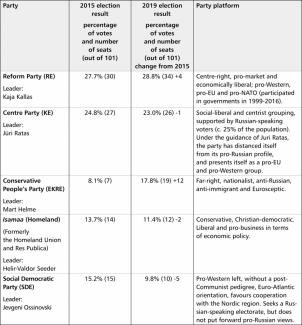Estonia: the liberal Reform Party returns to power

The elections in Estonia have been won by the opposition liberal Reform Party, which got 28.8% of the votes and 34 seats in the 101-seat parliament. All indications are that the leader of this party, Kaja Kallas (the daughter of the party’s founder, the former Prime Minister Siim Kallas), will be the first woman in Estonia to lead a government. Second place in the voting on 3 March went to the social-liberal Centre Party, led by the former Prime Minister Jüri Ratas, winning 23% of support (26 seats). The third biggest group in the Estonian parliament will be the far-right and nationalist Conservative People’s Party (EKRE). This group more than doubled its support, to win 17.8% of the vote and 19 seats. The parties making up the current coalition with the centrists also entered parliament, but were notably weakened: Isamaa (11.4% support, 12 seats) and the Social Democratic Party (9.8% support, 10 seats). The turnout was 63.1%.
Commentary
- The Reform Party’s victory in the elections and its increased parliamentary representation (by four seats) will allow it to return to power. To create a governing coalition, Kaja Kallas may engage in cooperation with either the Centre or the two weaker groups, the Social Democratic Party and Isamaa. The Reform Party’s leader has only definitively ruled out cooperation with the anti-EU Conservative People’s Party. On 6 March, Kallas announced that she is initiating talks to form a collation with the Centre Party, as together these two parties will represent up to two-thirds of the electorate. Many voters anticipated just such a deal, in the belief that it will be stable. Such a choice, however, would require major political compromises, mainly from the Centre Party. Before the election Kallas identified the limits of any future cooperation: she announced that the flat tax would be maintained, as would examinations in the Estonian language to obtain citizenship, and the rollback of minority education in the Russian language. Meanwhile, the Centre Party has advocated the introduction of progressive taxation (the Ratas government set tax-free thresholds taking income level into account), facilitating the path to citizenship for people living permanently in Estonia, and maintaining education in Russian. Compromising with Reform could mean that the Centre Party loses support from its Russian-speaking voters.
- In the event the attempt to form a coalition between Reform and the Centre fails, Kallas may start talks with the Social Democrats & Isamaa, as there would not be any significant political clashes between these forces. Nor need Kallas fear a repeat of the situation of 2016, when the Social Democrats and Isamaa dissolved their coalition with Reform and formed a new one with the Centre Party; in the new parliament such a coalition would not have a majority. Kallas fears, however, that the work of such a coalition will be affected by mutual conflicts arising from both parties' cooperation in Ratas's previous cabinet. Regardless of the shape of the coalition built by the Reform Party, the new government will continue the country's pro-Western course in foreign policy. In domestic politics, the Reform Party will insist on continuing its programme of maintaining discipline in the state budget, preferring to make savings rather than increase social spending.
- The anti-EU far-right Conservative People’s Party (EKRE) enjoyed significant success in the elections. This grouping steered the electoral debate towards a focus on the future of Estonia in the EU, the rights of Russian speakers, the state’s policy towards immigrants, and negative demographic phenomena such as the country’s systematic depopulation. Of the Estonian political parties, EKRE most strongly insists on education in Estonian only, supporting the health system, and creating incentives for Estonians to return from abroad. In conjunction with its conservative demands in the moral and ethical spheres (opposition to abortion and any attempts to undermine the institution of marriage as the union of a man and woman), it sees these actions as a way for the nation to survive in the face of the dangers posed by globalisation, alcoholism and drug addiction. Critics accuse the party of holding racist and anti-immigrant views, pointing out its references to the symbols of extremist parties (such as the torchlight processions by the Blue Awakening nationalist youth movement associated with EKRE). The group’s growing popularity has been influenced by the migration crisis, Brexit and anti-EU sentiment in the EU. In the Estonian parliament, EKRE will represent the regions of the Estonian provinces which are depopulating most rapidly.

This is an updated version of the analysis published on 5 March 2019.




